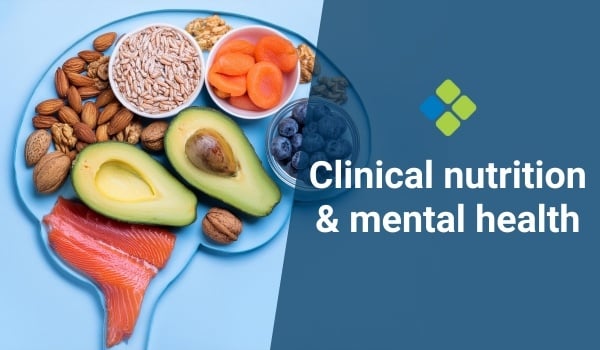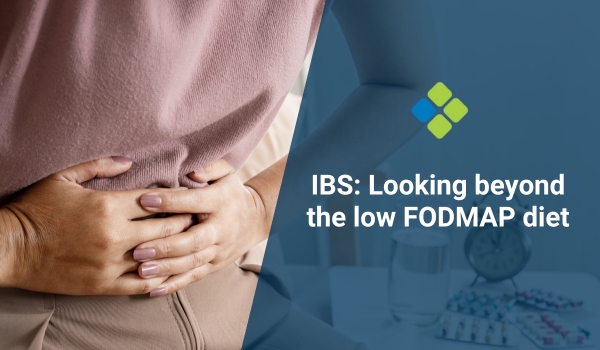Clinical nutrition and mental health
Read how GPs can support their patients’ mental health and wellbeing through evidence-based dietary strategies and clinical nutrition.

HealthCert Education
Nutrition plays an important role in mental health. Here’s how GPs can support their patients’ mental wellbeing through evidence-based dietary strategies.
Connection between nutrition and mental health
Research consistently shows that a well-balanced diet is an important aspect of managing mental health and can help alleviate symptoms of anxiety and depression. Perhaps one of the most well-known studies highlighting this connection is the SMILES trial, which was a randomised control trial finding that adopting a Mediterranean Diet can alleviate symptoms of depression [1].
More recent research has continued to build on this evidence, such as a study conducted this year which found that lifestyle interventions delivered by dietitians and exercise physiologists were just as effective in improving depressive symptoms as psychotherapy [2].
While overall diet quality is key, specific nutrients within healthy dietary patterns may play a significant role in supporting mental health. These include:
Omega-3 fatty acids
Found in fatty fish, flaxseeds, extra virgin olive oil and walnuts, omega-3s have been shown to support brain health and may support overall wellbeing [3]. GPs can encourage patients to incorporate these foods to promote mental wellbeing.
Antioxidants and B vitamins
Foods rich in antioxidants (like fruits and vegetables) and B vitamins (found in whole grains and leafy greens) are important for supporting mental health, and deficiencies in these nutrients have been linked to increased anxiety and depression [4].
Limit ultra-processed foods
Ultra-processed foods such as sugary drinks and fast foods may negatively affect mental health. A 2022 meta-analysis found that higher consumption of ultra-processed food is associated with increased risk of depression [5].
Gut-brain connection
The gut microbiota, particularly species like Firmicutes and Bacteroidetes, impact mental health via the microbiota-gut-brain axis. Dysbiosis of the gut microbiota has been associated with conditions like anxiety and depression [6]. GPs can discuss the gut-brain connection with patients and recommend dietary changes that promote gut health, such as including a diverse amount of plant foods [7].
Implementing nutritional strategies in practice
Educating patients about the importance of nutrition in mental health can empower them to make healthier food choices. Simple dietary modifications, such as increasing intake of fruits, vegetables, whole grains, and healthy fats, can lead to significant improvements in mental well-being.
GPs can support patients' mental health by integrating nutrition into their care strategies. By strengthening their understanding of the relationship between nutrition and mental health, they can improve patient wellbeing.
– Sarah Marko, Accredited Practising Dietitian
Learn more with HealthCert's online courses in Clinical Nutrition.
Read another article in Clinical Nutrition.
|
|
|
References
[1] Opie RS, O’Neil A, Jacka FN, Pizzinga J, Itsiopoulos C. A modified Mediterranean dietary intervention for adults with major depression: Dietary protocol and feasibility data from the SMILES trial. Nutr Neurosci 2018. https://doi.org/10.1080/1028415X.2017.1312841.
[2] O'Neil A, Perez J, Young LM, John T, Turner M, Saunders D, Mahoney S, Bryan M, Ashtree DN, Jacka FN, Bruscella C, Pilon M, Mohebbi M, Teychenne M, Rosenbaum S, Opie R, Hockey M, Peric L, De Araugo S, Banker K, Davids I, Tembo M, Davis JA, Lai J, Rocks T, O'Shea M, Mundell NL, McKeon G, Yucel M, Absetz P, Versace V, Manger S, Morgan M, Chapman A, Bennett C, Speight J, Berk M, Moylan S, Radovic L, Chatterton ML. Clinical and cost-effectiveness of remote-delivered, online lifestyle therapy versus psychotherapy for reducing depression: results from the CALM non-inferiority, randomised trial. Lancet Reg Health West Pac. 2024 Jul 31;49:101142. doi: 10.1016/j.lanwpc.2024.101142. PMID: 39381019; PMCID: PMC11459004.
[3] Dighriri IM, Alsubaie AM, Hakami FM, Hamithi DM, Alshekh MM, Khobrani FA, Dalak FE, Hakami AA, Alsueaadi EH, Alsaawi LS, Alshammari SF, Alqahtani AS, Alawi IA, Aljuaid AA, Tawhari MQ. Effects of Omega-3 Polyunsaturated Fatty Acids on Brain Functions: A Systematic Review. Cureus. 2022 Oct 9;14(10):e30091. doi: 10.7759/cureus.30091. PMID: 36381743; PMCID: PMC9641984.
[4] Zielińska M, Łuszczki E, Dereń K. Dietary Nutrient Deficiencies and Risk of Depression (Review Article 2018-2023). Nutrients. 2023 May 23;15(11):2433. doi: 10.3390/nu15112433. PMID: 37299394; PMCID: PMC10255717.
[5] Lane MM, Gamage E, Travica N, Dissanayaka T, Ashtree DN, Gauci S, Lotfaliany M, O'Neil A, Jacka FN, Marx W. Ultra-Processed Food Consumption and Mental Health: A Systematic Review and Meta-Analysis of Observational Studies. Nutrients. 2022 Jun 21;14(13):2568. doi: 10.3390/nu14132568. PMID: 35807749; PMCID: PMC9268228.
[6] Xiong RG, Li J, Cheng J, Zhou DD, Wu SX, Huang SY, Saimaiti A, Yang ZJ, Gan RY, Li HB. The Role of Gut Microbiota in Anxiety, Depression, and Other Mental Disorders as Well as the Protective Effects of Dietary Components. Nutrients. 2023 Jul 23;15(14):3258. doi: 10.3390/nu15143258. PMID: 37513676; PMCID: PMC10384867.
[7] McDonald D, Hyde E, Debelius JW, Morton JT, Gonzalez A, Ackermann G, et al. American Gut: an Open Platform for Citizen Science Microbiome Research. MSystems 2018. https://doi.org/10.1128/msystems.00031-18.

 1800 867 1390
1800 867 1390
 How to claim your CPD hours
How to claim your CPD hours





